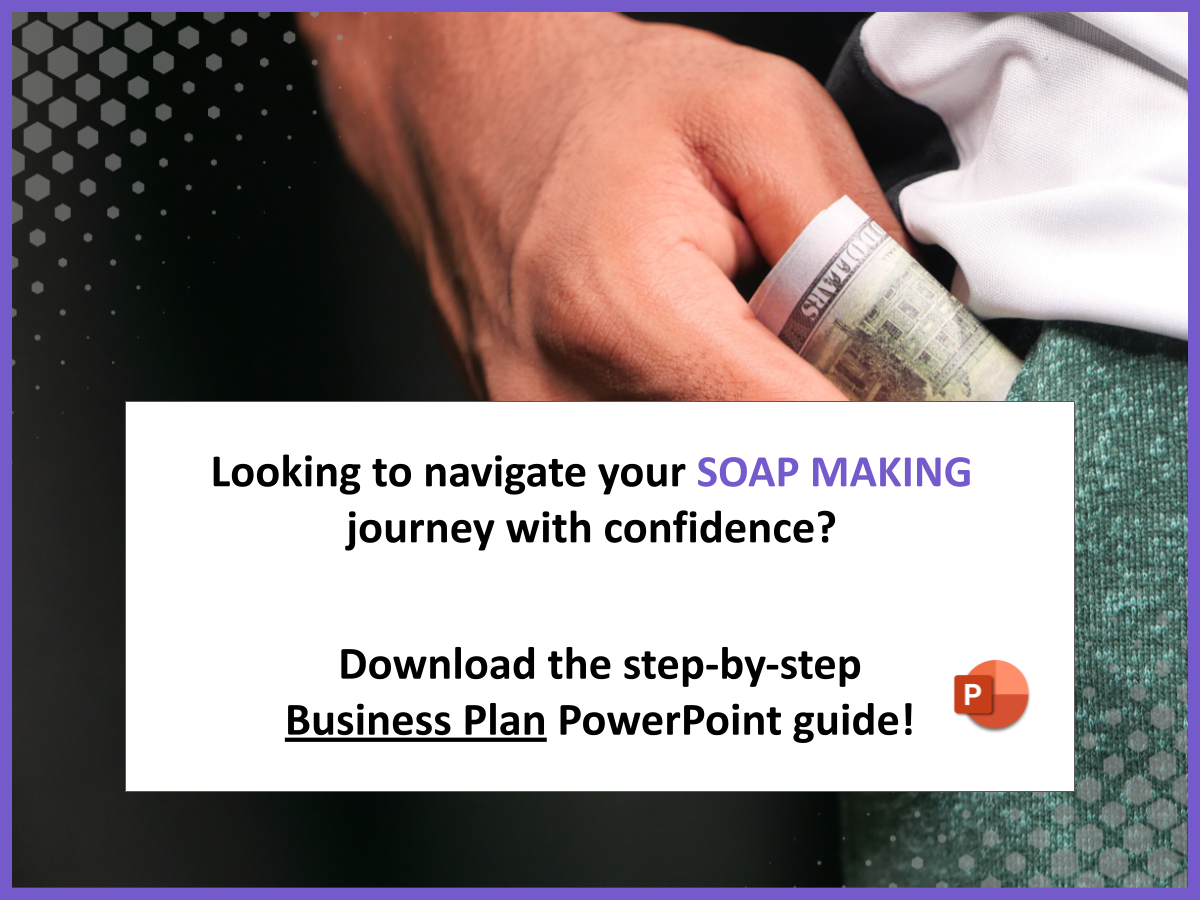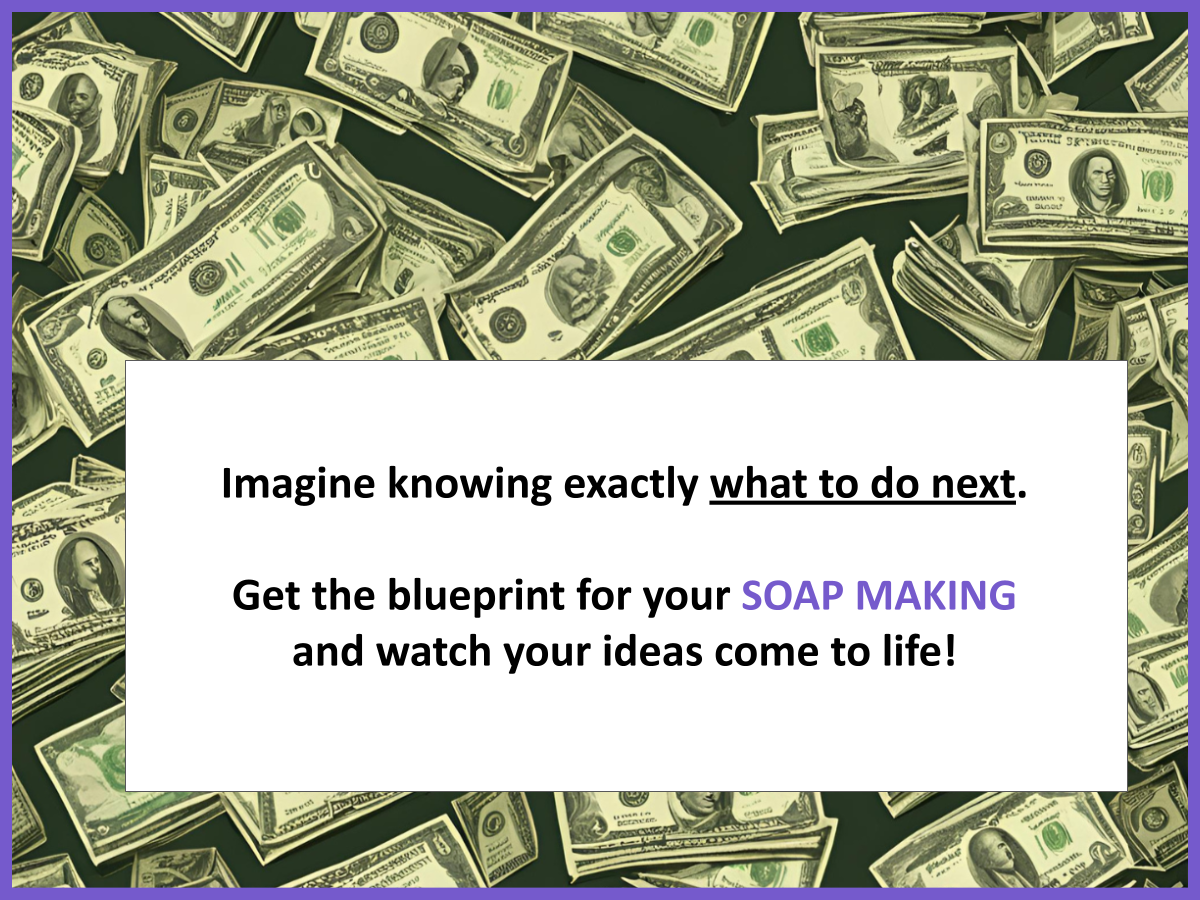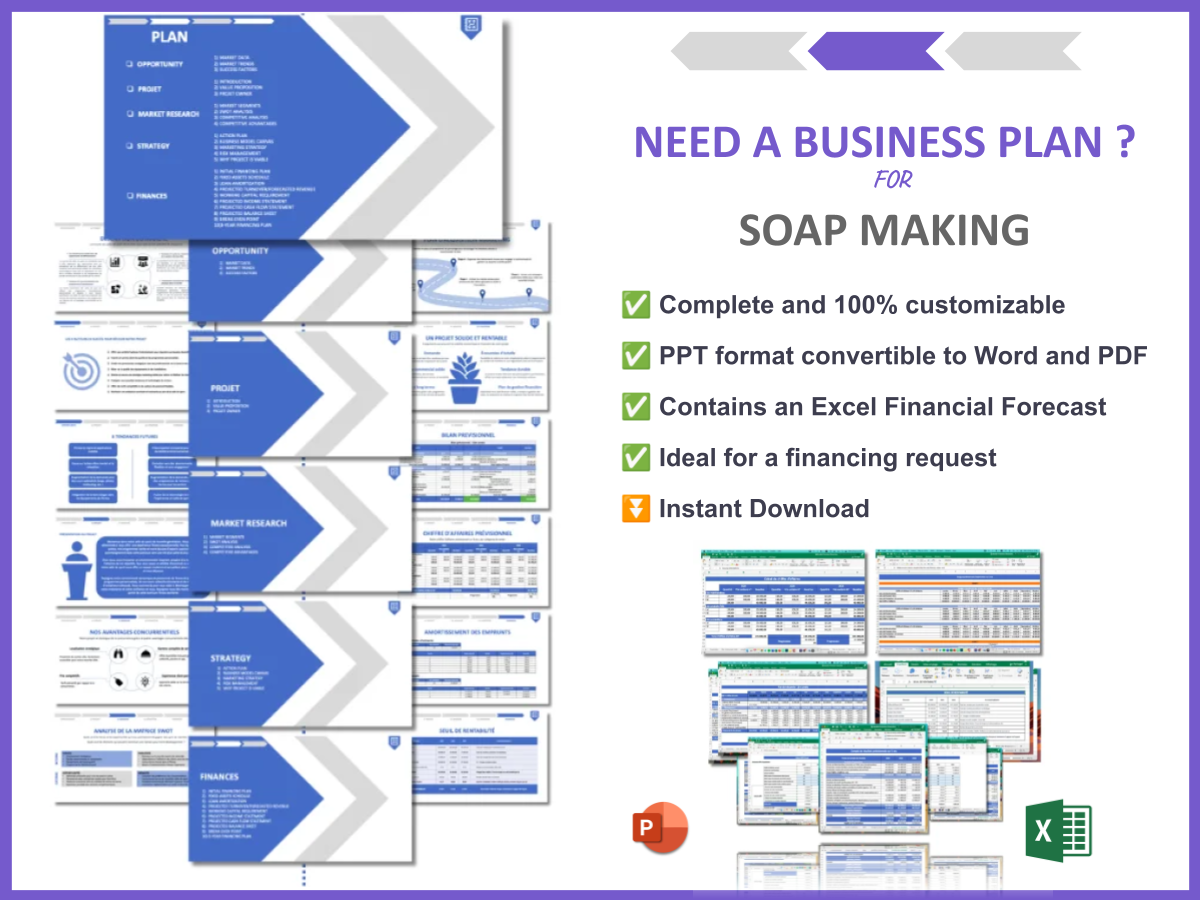Are you thinking about starting a soap making business? You’re not alone! The soap-making industry has been growing steadily, with many aspiring entrepreneurs discovering the joy of creating unique, handcrafted products. The best part? People are always looking for natural and artisanal options. If you’re passionate about crafting and want to turn that into a profitable venture, this guide is for you!
In this article, we’ll cover the essential steps to get you started on your soap-making journey:
- Understanding the basics of soap making.
- Researching your market and competition.
- Creating a solid business plan.
- Choosing the right supplies and equipment.
- Marketing your soap products effectively.
- Ensuring compliance with legal requirements.
1. Why You Should Consider How to Start a Soap Making Business?
Starting a soap making business can be a rewarding venture, both creatively and financially. Did you know that the global soap market is expected to reach over $40 billion by 2025? This growing demand indicates that there’s room for new players in the field. If you’re looking for a way to express your creativity while also generating income, soap making could be your ideal path.
Not only does this business allow you to craft unique products, but it also offers flexibility in how you operate. You can start small from home and gradually expand as you gain more customers and confidence. Plus, the satisfaction of seeing someone enjoy a product you created is priceless!
Here are a few reasons why you should consider starting your own soap-making business:
- Creative Freedom: You can experiment with different scents, colors, and ingredients.
- Low Startup Costs: With minimal initial investment, you can begin crafting.
- Growing Market: Consumers are increasingly seeking natural and handmade products.
Ultimately, if you have a passion for crafting and a desire to create something special, starting a soap making business can be a fulfilling journey.
2. What Are the Basics of How to Start a Soap Making Business?
Before diving in, it’s crucial to grasp the fundamentals of soap making. This includes understanding the different methods (like cold process, hot process, and melt & pour), ingredients (oils, lye, and additives), and safety precautions. Don’t skip this step; it’s the foundation of your business!
Here’s a breakdown of the main soap-making methods:
| Method | Time Required | Skill Level |
|---|---|---|
| Cold Process | 2-4 weeks | Intermediate |
| Hot Process | 1-2 hours | Intermediate |
| Melt and Pour | 1 hour | Beginner |
Each method has its pros and cons, so choose one that aligns with your skills and goals. If you’re just starting out, the melt and pour method is an excellent way to get your feet wet. It requires minimal equipment and is perfect for beginners. You can find various soap making recipes online to help you kick off your journey.
Additionally, consider investing in a few essential supplies, such as:
- Soap Base: For melt & pour.
- Lye: For cold/hot process.
- Oils: Like coconut, olive, or palm.
- Additives: Fragrance oils, colorants, and exfoliants.
Once you have a grasp on the basics, you can begin experimenting with different ingredients and techniques to develop your unique soap products.
3. How to Research Your Market for Soap Making?
Understanding your market is key to success in the soap making business. Start by identifying your target audience. Are they eco-conscious consumers, gift shoppers, or skincare enthusiasts? Once you know who you’re selling to, analyze your competitors. What are their strengths and weaknesses? What unique offerings can you bring to the table?
To streamline your research, consider creating a simple table to compare your competitors:
| Competitor | Strengths | Weaknesses |
|---|---|---|
| Competitor A | Unique scents, eco-friendly packaging | High prices |
| Competitor B | Wide range of products | Poor customer service |
| Competitor C | Local sourcing, handmade | Limited online presence |
Use this information to shape your business strategy. For instance, if you find that many competitors lack an online presence, you can leverage this by creating a robust website and utilizing social media to connect with customers. Additionally, gather feedback through surveys or social media polls to better understand what your potential customers are looking for in handmade soaps.
By thoroughly researching your market, you can tailor your products and marketing strategies to meet the needs of your target audience, which will ultimately help you stand out in a competitive landscape.
4. How to Develop a Business Plan for Your Soap Making Business?
Creating a business plan is crucial for any new venture. It helps clarify your goals, outlines your strategy, and serves as a roadmap for your business. A solid business plan can also be a vital tool if you need to secure funding or attract partners.
When developing your business plan, consider including the following sections:
- Executive Summary: A brief overview of your business idea, mission, and vision.
- Market Analysis: Insights from your market research, including target audience and competitor analysis.
- Marketing Strategy: How you plan to promote your products and reach your audience.
- Financial Projections: Estimated costs, revenue, and profit margins.
I recommend checking out this business plan template for Soap Making. It’s super detailed and can save you a ton of time! By following a structured template, you can ensure that you cover all necessary aspects of your business plan, making it easier to follow and implement.
Once your business plan is complete, review it regularly. As your soap making business grows, you may need to adjust your strategies based on market trends or customer feedback. Having a clear plan in place allows you to adapt and stay on track toward achieving your goals.
5. What Supplies Do You Need to Start Soap Making?
Gathering the right supplies is a critical step in learning how to start a soap making business. The quality of your ingredients will significantly impact the final product, so it’s essential to choose wisely. Here’s a list of essential supplies you’ll need to kickstart your soap-making journey:
- Soap Base: If you’re starting with the melt & pour method, choose a high-quality soap base.
- Lye: Required for cold and hot process soap making; ensure you handle it with care.
- Oils: Common options include coconut, olive, and palm oils, each providing different benefits.
- Additives: Consider fragrance oils, colorants, and exfoliants to enhance your soaps.
- Safety Gear: Gloves, goggles, and a mask are essential for protecting yourself during the soap-making process.
To help you organize your shopping, here’s a simple table outlining the supplies and their uses:
| Supply | Use |
|---|---|
| Soap Base | Starting point for melt & pour soaps. |
| Lye | Used in cold/hot process for saponification. |
| Essential Oils | Adds fragrance and therapeutic properties. |
Once you have your supplies, organize them in a way that makes your soap-making process smooth and efficient. Having everything readily available will help you focus on creativity rather than searching for materials while you work.
6. How to Choose the Right Name for Your Soap Making Business?
Your business name is your brand’s first impression. Make it memorable, relevant, and easy to spell. A catchy name can make a significant difference in attracting customers! Here are some tips to help you choose the right name for your soap making business:
- Brainstorm Keywords: Think about words related to soap, nature, or your unique selling proposition.
- Check Domain Availability: If you plan to go online, ensure your business name is available as a domain name.
- Get Feedback: Share your top name choices with friends and family for their opinions.
Additionally, consider the following aspects when finalizing your business name:
- Brand Identity: Your name should align with your brand’s values and aesthetic.
- Future Growth: Choose a name that allows for potential expansion into other products.
- Uniqueness: Ensure your name stands out from competitors to avoid confusion.
By investing time into selecting the perfect name, you can create a strong foundation for your soap making business that resonates with your audience and builds brand loyalty.
7. How to Market Your Soap Products Effectively?
Marketing is essential for any business, especially in the competitive world of soap making. To stand out, you need a solid marketing strategy that resonates with your target audience. Here are some effective ways to promote your soap products:
- Utilize Social Media: Platforms like Instagram and Facebook are perfect for showcasing your products. Share beautiful images, behind-the-scenes processes, and customer testimonials to engage your audience.
- Collaborate with Influencers: Partnering with influencers in the beauty and wellness niche can help you reach a larger audience. They can promote your soaps through their platforms, giving you credibility and visibility.
- Create a Newsletter: Build an email list to keep your customers informed about new products, promotions, and soap-making tips. This keeps your brand fresh in their minds and encourages repeat purchases.
To further enhance your marketing efforts, consider these strategies:
- Participate in Local Craft Fairs: Set up a booth to showcase your products and connect with local customers. This allows for face-to-face interaction, which can help build trust.
- Engage in Content Marketing: Start a blog on your website where you can share tips, recipes, and the benefits of your ingredients. This can improve your search engine ranking and attract organic traffic.
- Offer Promotions: Consider running limited-time discounts or bundle deals to entice new customers and encourage existing ones to buy more.
By employing a mix of these marketing strategies, you can effectively promote your soap making business and attract a loyal customer base.
8. What Legal Considerations Should You Be Aware of for Soap Making?
When starting your soap making business, it’s crucial to understand the legal requirements involved. This ensures that you operate within the law and protect yourself from potential liabilities. Here are some key legal considerations to keep in mind:
- Register Your Business: Choose a business structure (sole proprietorship, LLC, etc.) and register your business name with the appropriate government agency.
- Obtain Necessary Licenses: Depending on your location, you may need specific licenses to sell cosmetics. Research local regulations to ensure compliance.
- Labeling Requirements: Your soap products should be properly labeled, including ingredients and any necessary disclaimers. This is especially important if you are using essential oils or other potentially allergenic ingredients.
Here’s a quick checklist of legal steps to consider:
- Register your business name
- Apply for a tax identification number
- Obtain necessary permits for selling cosmetics
Consulting with a legal expert familiar with cosmetic regulations can help you navigate these requirements effectively. Taking care of these details can save you from future headaches and ensure that your soap making business operates smoothly and legally.
9. How to Set Up Your Financial Management Systems?
Managing your finances properly is crucial for your soap making business. Without a clear understanding of your financial situation, it’s easy to overspend or underprice your products. Here are some steps to help you establish a solid financial management system:
- Choose Accounting Software: Invest in user-friendly accounting software like QuickBooks or FreshBooks to track your income and expenses effectively.
- Separate Business and Personal Finances: Open a dedicated business bank account to keep your finances organized. This helps in accurate bookkeeping and simplifies tax preparation.
- Create a Budget: Outline your expected income and expenses. This will help you understand how much you can spend on supplies and marketing while ensuring profitability.
To give you a clearer picture of your finances, here’s a simple table for tracking income and expenses:
| Category | Estimated Amount | Actual Amount |
|---|---|---|
| Income from Soap Sales | $500 | $450 |
| Expenses for Supplies | $200 | $250 |
| Marketing Costs | $100 | $80 |
Regularly reviewing your financial statements will help you make informed decisions and adjust your business strategies as needed. Keeping a close eye on your finances is essential for the long-term success of your soap making business.
10. How to Create a Strong Brand Identity for Your Soap Business?
Your brand identity is what sets you apart from the competition in the soap making industry. A strong brand can help you build customer loyalty and establish your business in the marketplace. Here are some key elements to consider when developing your brand identity:
- Logo Design: Create a visually appealing logo that reflects your brand’s values and the essence of your soap products. This logo will be used on your packaging, website, and promotional materials.
- Packaging Style: Invest in quality packaging that not only protects your products but also represents your brand. Eco-friendly materials can attract environmentally conscious consumers.
- Brand Voice and Messaging: Establish a consistent tone for your communication, whether it’s playful, professional, or informative. This voice should be reflected in your website, social media posts, and marketing materials.
Consider the following aspects when creating your brand identity:
- Target Audience: Tailor your branding to appeal to your specific audience. Understanding their preferences will guide your design choices.
- Storytelling: Share your story and the inspiration behind your soap-making journey. Authenticity can resonate with customers and help build emotional connections.
- Consistency: Ensure that all your branding elements are cohesive across different platforms. This includes colors, fonts, and imagery.
By investing time in developing a strong brand identity, you can create a lasting impression and foster customer loyalty in your soap making business.
11. How to Develop an Online Presence for Your Soap Making Business?
In today’s digital world, having a strong online presence is essential for your soap making business. Your website serves as the primary platform for showcasing your products and connecting with customers. Here are some key elements to consider when developing your online presence:
- Professional Website: Create a user-friendly website that highlights your soap products, tells your brand story, and provides an easy shopping experience. Use high-quality images and engaging content to attract visitors.
- Search Engine Optimization (SEO): Optimize your website for search engines to improve your visibility. Use relevant keywords, such as soap making and handmade soap, in your content to rank higher in search results.
- Social Media Integration: Connect your website with social media accounts to drive traffic. Share updates, promotions, and behind-the-scenes content to engage your audience and build a community.
Consider these additional features to enhance your website:
- Product Catalog: Include detailed descriptions, prices, and high-quality images of each soap product.
- Blog Section: Start a blog to share tips, recipes, and the benefits of your ingredients. This can improve your SEO and establish you as an authority in the soap making niche.
- Contact Information: Make it easy for customers to reach you with questions or inquiries. Include a contact form or your email address.
Investing in a professional online presence can significantly boost your soap making business, allowing you to reach a wider audience and drive sales.
12. How to Sell Your Soap Products Online and Offline?
Consider multiple sales channels to maximize your reach in the soap making business. Selling both online and offline can help you attract a diverse customer base. Here are some effective strategies for each approach:
- Online Sales: Set up an online store through your website or platforms like Etsy. Ensure your product listings are optimized with keywords and engaging descriptions. Use social media to promote your online shop and drive traffic.
- Offline Sales: Participate in local craft fairs, farmers’ markets, or pop-up shops. This allows you to connect with customers face-to-face and showcase your products in person.
- Collaborate with Local Businesses: Partner with local boutiques or wellness stores to carry your soap products. This can expand your reach and introduce your brand to new customers.
To streamline your sales process, consider the following:
- Inventory Management: Keep track of your stock levels to avoid overproducing or running out of popular items.
- Payment Options: Offer multiple payment methods (credit cards, PayPal, etc.) to make purchasing convenient for customers.
- Customer Service: Provide excellent customer service to encourage repeat business and positive word-of-mouth.
By employing a mix of online and offline sales strategies, you can effectively promote your soap making business and attract a loyal customer base.
13. What Are the Common Challenges in Starting a Soap Making Business?
Every business comes with its challenges, and the soap making industry is no exception. From sourcing materials to managing finances, it’s important to be prepared. Here are some common challenges you might face:
- Finding Reliable Suppliers: It can be difficult to locate trustworthy suppliers for quality ingredients. Build relationships with multiple suppliers to ensure consistent access to materials.
- Managing Production Costs: Keeping costs under control while maintaining quality is a balancing act. Regularly review your expenses and find ways to optimize your production process.
- Standing Out in a Competitive Market: With many artisans entering the soap-making space, differentiating your products can be challenging. Focus on unique formulations, branding, and customer engagement.
To overcome these challenges, consider the following strategies:
- Continuous Learning: Stay updated on industry trends and techniques through workshops, online courses, and networking with other soap makers.
- Feedback Loop: Regularly seek feedback from customers to understand their needs and preferences, which can help you refine your products.
- Networking: Join local or online soap-making communities to share experiences, resources, and support each other through challenges.
By anticipating these challenges and developing strategies to address them, you can position your soap making business for long-term success and growth.
Conclusion
Starting a soap making business can be an exciting and fulfilling journey. By following the steps outlined in this guide, from understanding the basics to developing a strong online presence, you can set yourself up for success. Remember, the key is to remain adaptable, learn from challenges, and continuously refine your products and marketing strategies.
For further insights, I encourage you to check out our articles on how to create a SWOT Analysis for Soap Making and how to initiate a Soap Making Marketing Plan. These resources will provide you with valuable information to enhance your business planning and marketing efforts.
Embrace your creativity, stay committed, and watch your soap making business flourish!
FAQ
- What are the basic ingredients needed for soap making? The essential ingredients for soap making include oils (like coconut and olive), lye (for cold and hot processes), and additives such as fragrances and colorants.
- Can I start a soap making business from home? Yes, many successful soap making businesses start from home. It allows for low startup costs and flexibility in production.
- What is the best method for beginners in soap making? The melt and pour method is ideal for beginners as it requires minimal equipment and is easy to learn.
- How can I market my handmade soap? Utilize social media, create an engaging website, participate in local markets, and collaborate with influencers to effectively market your handmade soap.
- Do I need a license to sell soap? Depending on your location, you may need specific licenses or permits to sell cosmetics, including soap. Always check local regulations.
- What are some popular scents for soap making? Popular scents include lavender, eucalyptus, citrus, and vanilla. Experimenting with essential oils can help you create unique blends.
- How do I price my soap products? Calculate the cost of materials, labor, and overhead to determine your pricing. Research competitors to ensure your prices are competitive.
- What packaging should I use for my soap? Choose eco-friendly packaging that reflects your brand identity. Options include biodegradable wraps, recycled paper, or glass containers.
- How can I improve my soap making skills? Attend workshops, join online communities, and practice regularly to enhance your skills and learn new techniques.
- What are the common mistakes to avoid in soap making? Common mistakes include not measuring ingredients accurately, skipping safety precautions with lye, and not allowing soap to cure properly.







